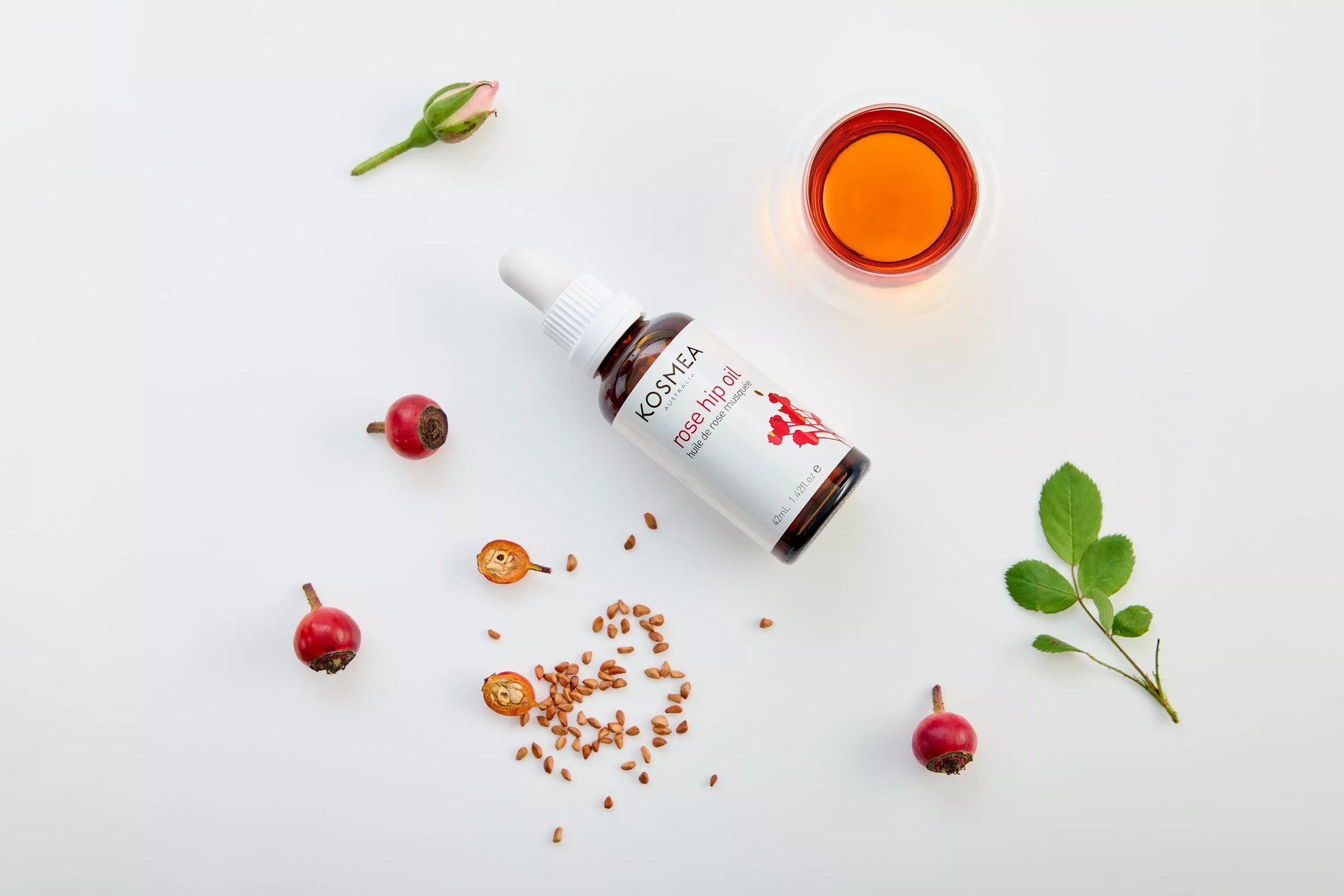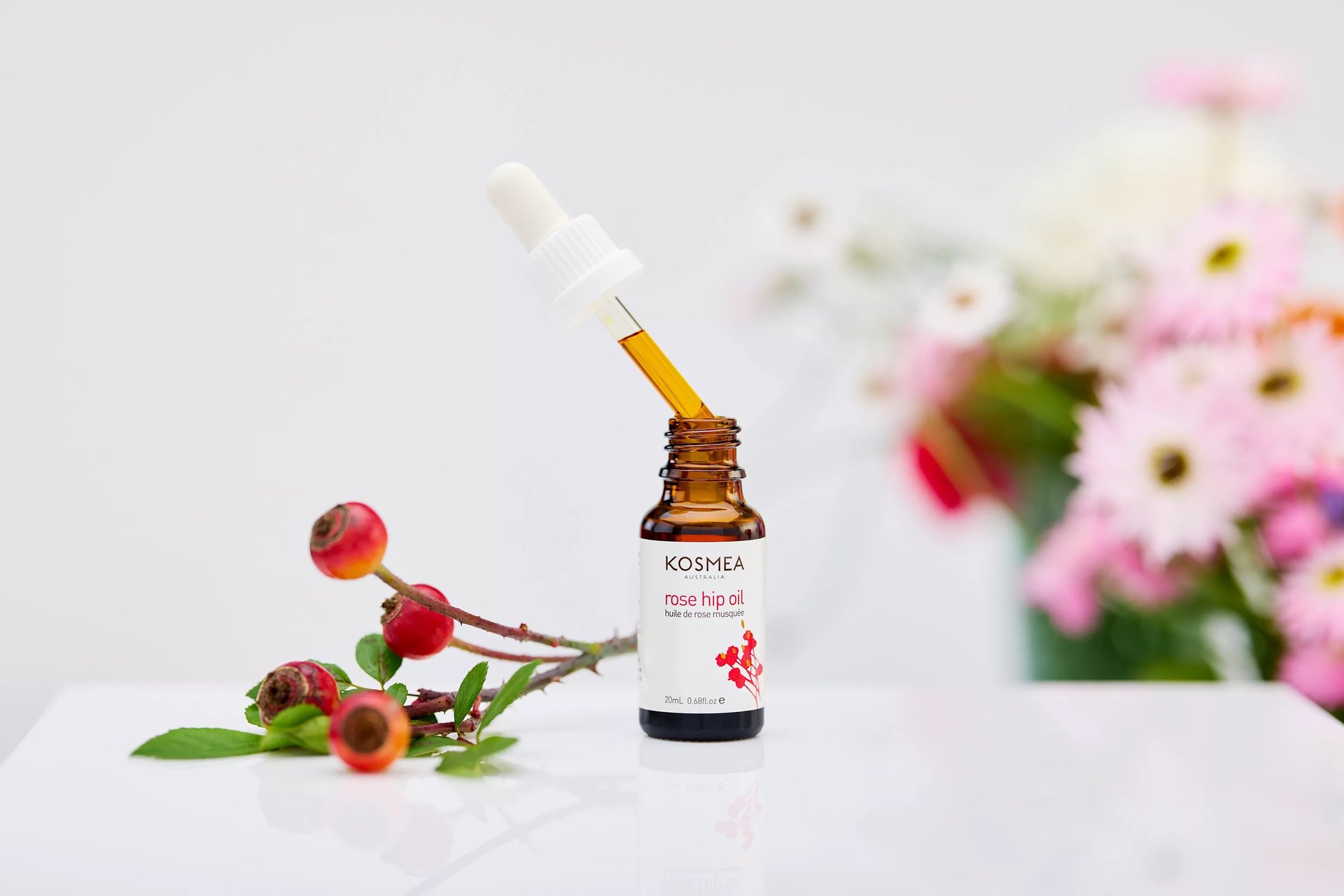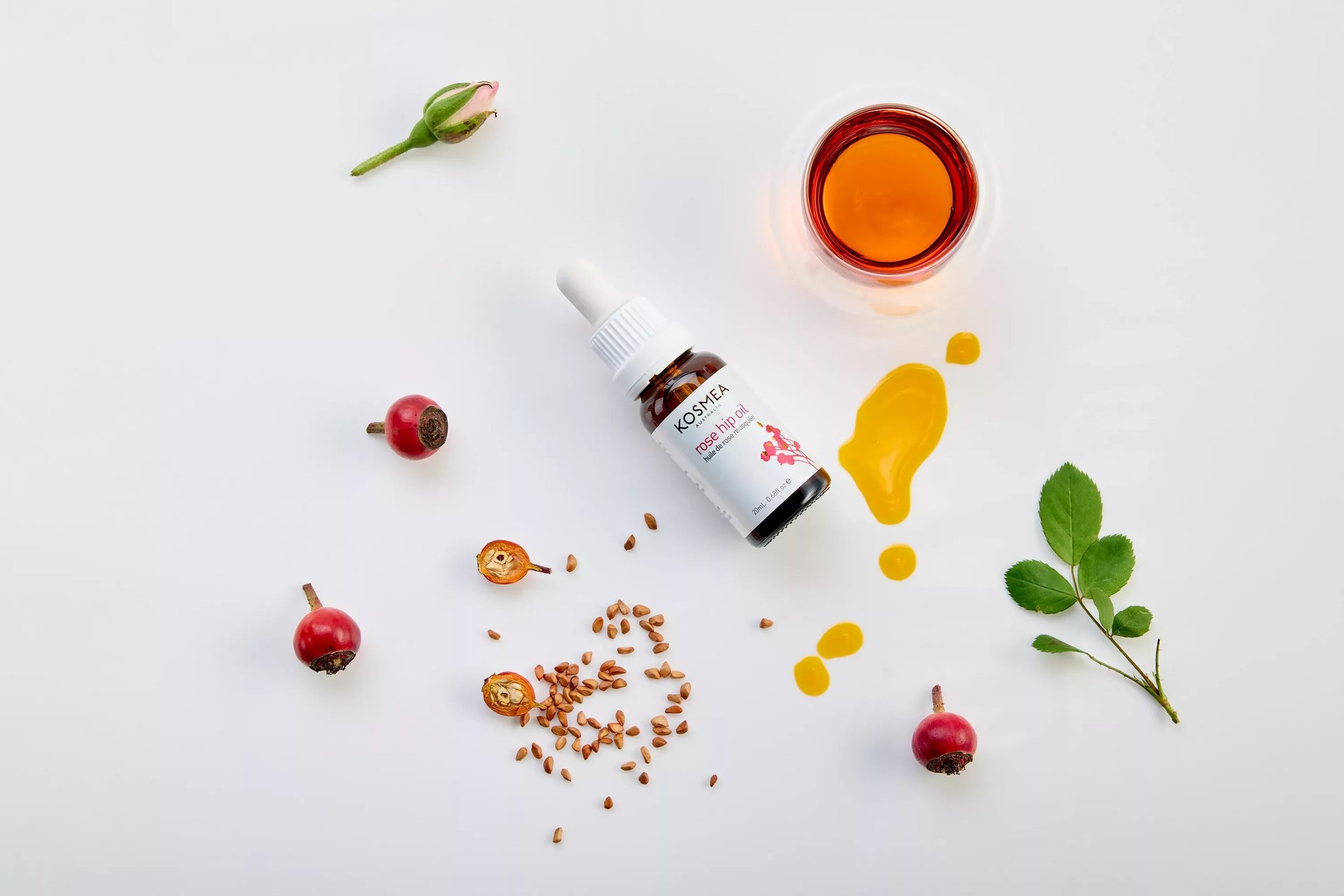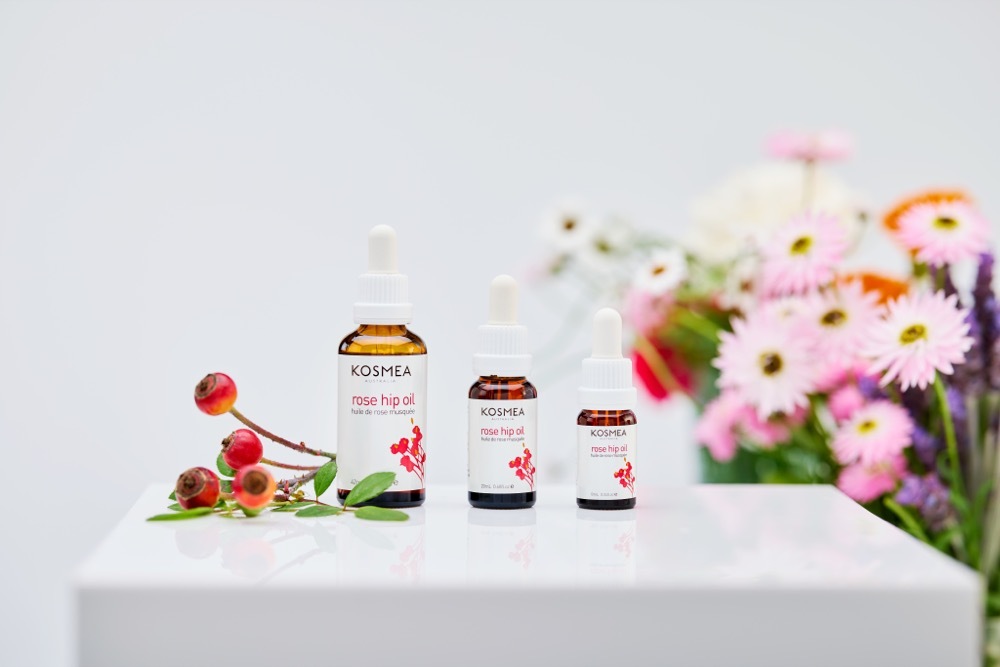Everything You Need to Know About Rosehip Oil
Discover the power of one of Mother Nature’s skincare elixirs - Rosehip Oil.
In this guide, we’ll explore everything you need to know about this nutrient-rich oil, from where it’s sourced and how it’s made, to the skin benefits for a range of conditions backed by science and tradition. Whether you have fine lines, sun damage, dry and sensitive skin, new or old scars, inflammation, or eczema and psoriasis, Rosehip Oil is a gentle yet potent addition to your everyday skincare routine.
Table Of Contents
- What is Rosehip Oil?
- Where Are the Rosehips Grown?
- What’s in Rosehip Oil?
- How Does Vitamin A Help the Skin?
- How Does Rosehip Oil Benefit the Skin?
- Rosehip Oil and Anti-Ageing
- Rosehip Oil for Dry and Sensitive Skin
- Rosehip Oil and Acne
- How to Use Rosehip Oil
- Benefits of Rosehip Oil
- Using Rosehip Oil on Hair
- How Is Rosehip Oil Extracted?
- Choosing a Rosehip Oil
What is Rosehip Oil?
Rosehip oil is extracted from the seeds of the rosehip, which is the fruit of the wild rose bush, particularly the Rosa canina species. Unlike rose oil, which is derived from rose petals, rosehip oil is obtained from the seeds and fruit of the rose plant after the rose has flowered and the petals have fallen. The rosehips are the vibrant red-orange fruits that remain on the bush post-bloom.
Where Are the Rosehips Grown?
The wild rose bush is grown in cool, temperate climates, often in high-altitude, wild-growing regions such as Lesotho, Chile and Argentina, to produce the best rosehips. These environments support the wild rose species which thrive in clean air, rich soil, and minimal human interference, to produce nutrient-dense fruits.

What’s in Rosehip Oil?
Rosehip oil is a powerhouse of skin-loving nutrients:
- Essential Fatty Acids: Rich in omega3 and omega6, these acids help replenish, repair, and hydrate the skin. Since the body cannot produce them naturally, they must be obtained through diet or topical application.
- Vitamin A (Trans-Retinoic Acid or Tretinoin): Supports skin renewal and has been shown to combat premature ageing by boosting collagen production, especially after sun exposure. Sun exposure can trigger enzymes that break down collagen and elastin whose role it is to keep the skin firm and youthful. Vitamin A in Rosehip Oil helps block those enzymes and encourages fresh collagen to form, supporting smoother, more radiant skin through natural regeneration.
- Vitamin C: Helps brighten and even out skin tone.
- Antioxidants: Protect the skin’s natural barrier and defend against environmental stressors.
Thanks to its lightweight molecular structure, rosehip oil absorbs quickly and deeply into the skin, nourishing and hydrating while supporting the repair of skin cells from within.

How Does Vitamin A Help the Skin?
Vitamin A is a collagen-boosting nutrient crucial for skin health. It supports cell turnover, aiding the skin in renewing itself more effectively. In skincare, vitamin A is often used to:
- Reduce the appearance of fine lines
- Improve skin tone
- Fade dark spots
- Soothe acne
- Promote a smoother, more even complexion

How Does Rosehip Oil Help the Skin?
The skin comprises the epidermis (outer layer) and the dermis beneath it. The epidermis acts as a barrier, while the dermis contains collagen, elastin, and blood vessels that provide strength and elasticity.
Rosehip oil penetrates the epidermis, strengthening the skin’s natural barrier by locking in moisture. It delivers antioxidants and vitamins to deeper layers, aiding in damage repair, collagen production, and overall skin resilience.
Rich in essential fatty acids, antioxidants, and natural vitamin A, rosehip oil:
- Hydrates and nourishes
- Improves skin tone and texture
- Reduces the appearance of fine lines, scars, and pigmentation
- Calms sensitivity and irritation, making it beneficial for conditions like dermatitis, eczema, psoriasis, and rosacea

Rosehip and Anti-Ageing
Rosehip oil contains a natural blend of nutrients that are beneficial in reducing the effects of ageing. Its high levels of vitamin A support skin cell turnover and collagen production, which can help reduce the appearance of fine lines and wrinkles. The essential fatty acids in Rosehip oil - Oleic acid, Palmitic acid, Linoleic acid, Gamma linolenic acid - help maintain the skin’s moisture barrier, keeping it hydrated and plump.
Additionally, antioxidants such as vitamin C, help protect the skin from oxidative stress caused by sun exposure and environmental damage which are key contributors to premature ageing.

Rosehip Oil for Dry and Sensitive Skin
Rosehip oil is lightweight in its molecular structure and therefore easily absorbed, so it’s able to deliver hydration to the skin without leaving a greasy residue. It’s also rich in essential fatty acids like omega 3 and 6, which help to strengthen the skin’s natural barrier by locking in moisture - essential in relieving dry and sensitive skin.
Anti-inflammatory properties calm redness, irritation, and flare-ups. Its natural antioxidants, such as vitamin E and polyphenols, support skin repair and protect against environmental stress. Because it’s gentle, it’s often well tolerated by even the most delicate or reactive skin types.

Rosehip Oil and Acne
Rosehip oil contains anti-inflammatory fatty acids, like linoleic acid, that can help calm redness and irritation that occurs with acne. It also has natural antibacterial properties and is non-comedogenic, meaning it won’t clog pores. The vitamin A in Rosehip oil supports skin cell turnover, preventing blocked pores and reducing the appearance of acne scars over time. Its high antioxidant content also helps protect the skin from environmental stressors that can trigger breakouts. With consistent use, Rosehip oil can help balance oily skin, soothe active blemishes, and promote a clearer, healthier complexion.

How do you use Rosehip Oil?
To incorporate rosehip oil into your skincare routine:
- Cleanse your face thoroughly.
- While skin is still slightly damp (ideally after a shower), apply 2–3 drops of rosehip oil to your fingertips.
- Gently press the oil into your face and neck, avoid harsh rubbing.
- Follow with your regular moisturiser or use rosehip oil as a standalone treatment.
- Use it morning and/or night, depending on your skin’s needs.
Tip: Mix a drop into your foundation or moisturiser for a radiant, dewy finish.
Benefits of Rosehip Oil
- Deep Hydration: Packed with essential fatty acids, rosehip oil delivers intense hydration, leaving your skin soft, supple, and nourished. Suitable for all skin types.
- Anti-Ageing: Rich in vitamin A (nature’s retinol), it naturally boosts collagen production, smoothing fine lines and improving skin elasticity without harsh side effects.
- Brightens and Evens Skin Tone: Helps reduce the appearance of pigmentation, scars, and sun damage, imparting a natural, healthy glow.
- Soothes Sensitivity: Gentle and calming, it reduces redness and inflammation, making it ideal for dry or sensitive skin and conditions like dermatitis, eczema, psoriasis, and rosacea.
- Supports Skin Repair: Promotes regeneration, aiding in the healing of scars and stretch marks. It helps the skin recover from environmental stressors, surgical procedures, and cosmetic treatments, reducing the incidence of scarring.

Using Rosehip Oil on Hair
Yes. Rosehip oil isn’t just for your skin. It can benefit your hair and scalp too. Rich in essential fatty acids and antioxidants, it helps to hydrate dry strands, soothe a flaky scalp, and reduce frizz. It may also support healthy hair growth by nourishing hair follicles and improving scalp health.
How to use it:
- Scalp treatment: Massage a few drops into your scalp, leave for 30 minutes, then shampoo as usual.
- Hair ends: Apply a small amount to dry or split ends to smooth and moisturise.
Frequency: Use 1- 2 times per week for best results.

How Is Rosehip Oil Extracted?
There are a few methods for extracting Rosehip oil, and each has a different impact on the oil's purity, nutrient content, and effectiveness:
Extraction Type
How it works
Benefits
Disadvantages
Result
Supercritical CO₂ Extraction (Best Method)
How It Works
Supercritical fluid extraction uses CO₂ to gently and eco-consciously extract delicate and heat-sensitive nutrients.
Benefits
The best method of extracting Rosehip Oil to preserve the integrity of nutrients. No heat or solvents.
Disadvantages
Expensive and therefore less common.
Result
Clean, pure and potent oil, amber in colour. Highest levels of Vitamin A, essential fatty acids, and antioxidants. Excellent shelf life.
Cold Pressing
How It Works
Seeds are mechanically ground and extracted at temperatures above 30C. This is still referred to as cold pressing.
Benefits
Preserves some of the essential nutrients. Commonly known.
Disadvantages
The seed of the rosehip is hard and must be ground at temperatures above 30C to extract the oil. This means that some of the valuable nutrients are destroyed.
Result
Often thought to be minimally processed, but extraction above 30C results in less antioxidants, Vitamin A and essential fatty acids.
Solvent Extraction
How It Works
Solvents (like hexane) are used to extract oil from seeds.
Benefits
Yields more oil per batch.
Disadvantages
May leave behind chemical residues and degrade nutrients.
Result
Less pure, often refined and deodorised.
Hot Pressing
How It Works
Seeds are heated to high temperatures before pressing.
Benefits
Faster extraction process.
Disadvantages
Heat can destroy delicate nutrients and reduce antioxidant content.
Result
Lower quality oil, often lighter in colour.
Choosing a Rosehip Oil
Not all rosehip oils are created equal. Here's how to find one that’s pure, potent, and with all the benefits that nature intended.
- 100% Pure Rosehip Oil: No added fillers, fragrances, or artificial colours. No parabens, sulphates, SLS/SLES and microbeads.
- Certified Organic: Grown without pesticides and certified by a reputable body (e.g., ACO, USDA).
- Quality Extraction Method: Extracted without heat and as naturally as possible to preserve vitamins and essential fatty acids.
- Natural Amber Colour: Unrefined, natural colour and scent are intact, meaning the nutrients are too.
- Dark Glass Bottle: Protects the oil from light and oxidation, preserving potency.

Do you have any other questions about Rosehip Oil?
Please email us at enquiries@kosmea.com.au/ or visit our official product page: https://kosmea.com.au/product/certified-organic-rosehip-oil
References*
https://pmc.ncbi.nlm.nih.gov/articles/PMC4655903/

